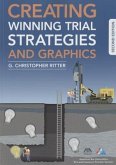- Broschiertes Buch
- Merkliste
- Auf die Merkliste
- Bewerten Bewerten
- Teilen
- Produkt teilen
- Produkterinnerung
- Produkterinnerung
MASTER THE LAW OF JURY SELECTION IN ILLINOIS "...AND THE ART OF JUROR DESELECTION" In a perfect world, jurors would leave their bias at the door, evaluating each case based solely on the facts. Unfortunately, in the real world, every juror approaches a case with prejudice, sometimes even reaching a verdict before taking a seat! As a trial lawyer, you need to understand how to properly deselect prospective jurors and get the right jury to win your case. In Kurt D. Lloyd On: Jury Selection, author and accomplished attorney Kurt Lloyd presents the first and only book for trial lawyers that…mehr
Andere Kunden interessierten sich auch für
![Mastering Voir Dire and Jury Selection Mastering Voir Dire and Jury Selection]() Jeffery T FrederickMastering Voir Dire and Jury Selection188,99 €
Jeffery T FrederickMastering Voir Dire and Jury Selection188,99 €![Preparing for a Federal Jury Trial Preparing for a Federal Jury Trial]() Willie J EppsPreparing for a Federal Jury Trial108,99 €
Willie J EppsPreparing for a Federal Jury Trial108,99 €![How to Get a Fair Trial by Jury How to Get a Fair Trial by Jury]() Randolph JacksonHow to Get a Fair Trial by Jury15,99 €
Randolph JacksonHow to Get a Fair Trial by Jury15,99 €![Employment Litigation: Model Jury Instructions Employment Litigation: Model Jury Instructions]() American Bar AssociationEmployment Litigation: Model Jury Instructions100,99 €
American Bar AssociationEmployment Litigation: Model Jury Instructions100,99 €![Winning Your Jury Winning Your Jury]() Robert G Klein EsqWinning Your Jury28,99 €
Robert G Klein EsqWinning Your Jury28,99 €![Copyright, Trademark and Trade Dress Litigation [With CDROM] Copyright, Trademark and Trade Dress Litigation [With CDROM]]() Copyright, Trademark and Trade Dress Litigation [With CDROM]102,99 €
Copyright, Trademark and Trade Dress Litigation [With CDROM]102,99 €![Creating Winning Trial Strategies and Graphics, Second Edition Creating Winning Trial Strategies and Graphics, Second Edition]() G Christopher RitterCreating Winning Trial Strategies and Graphics, Second Edition239,99 €
G Christopher RitterCreating Winning Trial Strategies and Graphics, Second Edition239,99 €-
-
-
MASTER THE LAW OF JURY SELECTION IN ILLINOIS "...AND THE ART OF JUROR DESELECTION" In a perfect world, jurors would leave their bias at the door, evaluating each case based solely on the facts. Unfortunately, in the real world, every juror approaches a case with prejudice, sometimes even reaching a verdict before taking a seat! As a trial lawyer, you need to understand how to properly deselect prospective jurors and get the right jury to win your case. In Kurt D. Lloyd On: Jury Selection, author and accomplished attorney Kurt Lloyd presents the first and only book for trial lawyers that comprehensively covers jury selection in Illinois, including: -statutory procedure for selecting jurors -law and rules for voir dire questioning of jurors -evidentiary standards for challenging for cause biased jurors -social media and juror discovery -juror misconduct and juror removal or mistrial Whether you're preparing for an upcoming trial or actually in the courtroom, this book offers all of the diffuse laws and procedures you'll need in one place.
Hinweis: Dieser Artikel kann nur an eine deutsche Lieferadresse ausgeliefert werden.
Hinweis: Dieser Artikel kann nur an eine deutsche Lieferadresse ausgeliefert werden.
Produktdetails
- Produktdetails
- Verlag: Advantage Media Group, Inc.
- Seitenzahl: 144
- Erscheinungstermin: 25. November 2016
- Englisch
- Abmessung: 254mm x 203mm x 8mm
- Gewicht: 299g
- ISBN-13: 9781599328126
- ISBN-10: 1599328127
- Artikelnr.: 46888356
- Herstellerkennzeichnung
- Produktsicherheitsverantwortliche/r
- Europaallee 1
- 36244 Bad Hersfeld
- gpsr@libri.de
- Verlag: Advantage Media Group, Inc.
- Seitenzahl: 144
- Erscheinungstermin: 25. November 2016
- Englisch
- Abmessung: 254mm x 203mm x 8mm
- Gewicht: 299g
- ISBN-13: 9781599328126
- ISBN-10: 1599328127
- Artikelnr.: 46888356
- Herstellerkennzeichnung
- Produktsicherheitsverantwortliche/r
- Europaallee 1
- 36244 Bad Hersfeld
- gpsr@libri.de
KURT D. LLOYD is a plaintiff's trial lawyer who has won over $300 million for injured clients. Kurt has been the plaintiff's lawyer in over seventy trials. Kurt focuses his practice on plaintiff's medical malpractice and other catastrophic injury cases. He is often hired as the lead plaintiff's trial lawyer by referring or partnering attorneys. Kurt also provides speaking and consulting services to other plaintiff's injury lawyers so that they win their cases. For more information about Kurt, go to KurtDLloyd.com.
Introduction Chapter 1: How Illinois Juries Are Selected 1.1. Summoning the
Potential Jurors to Court 1.1.a. Jury List of Potential Jurors 1.1.b.
Statutory Juror Qualifi cations (705 ILCS 305/2) 1.1.c. Statutory Juror
Disqualifi cation (705 ILCS 305/14) 1.1.c.1. Juror Hardship (705 ILCS
305/10.02) 1.1.c.2. Nursing Mothers 1.1.c.3. Juror's Total and Permanent
Disability 1.1.d. Excusing Prospective Jurors for Statutory Disqualifi
cation 1.1.e. Juror Has a Physical Impairment (735 ILCS 1106) Chapter 2:
The Voir Dire Examination Process 2.1. Twelve Jurors in the Box 2.2.
Supreme Court Rule 234 2.3. Court Conducted Voir Dire 2.3.a. The Trial
Judge Must Conduct an Adequate Voir Dire Examination 2.3.b. Abuse of
Discretion Standard 2.4. Attorney Conducted Voir Dire 2.4.a. Attorney's
Right to Direct Questioning of Prospective Jurors Is Strongly Favored
2.4.b. Court's Limitation of Time 2.5. The Order of Voir Dire 2.6. Jurors
Shall Be Accepted in Panels of Four 2.7. Back Striking 2.8. Choosing
Alternate Jurors Chapter 3: Scope of Voir Dire, Types of Questions Allowed
3.1. Questions Regarding a Juror's Attitudes toward Applicable Law or Jury
Instructions 3.1.a. Legal Liability 3.1.b. Legal Defenses 3.1.b.1.
Contributory Negligence (Plainti Conduct) 3.1.b.2. Insanity Defense
3.1.b.3. Accountability Defense 3.1.c. Burden of Proof 3.1.d. Questions
Allowed about a Juror's Attitudes toward Credibility of a Witness 3.1.d.1.
Incarcerated Person 3.1.d.2. Police O cer 3.1.d.3. Victim 3.1.e. Weight of
Circumstantial Evidence Versus Eyewitness Testimony 3.2. Questions Allowed
Relating to a Juror's Attitudes toward Certain Types of Anticipated
Evidence 3.2.a. Questions Allowed about a Juror's Attitudes toward
Liability Facts 3.2.b. Questions Allowed about a Juror's Attitudes toward
Certain Social Beliefs 3.2.b.1. Drugs and Alcohol 3.2.b.2. Interracial
Relationships 3.2.b.3. Remarriage 3.2.b.4. Tort Reform 3.2.b.5. Religious
Beliefs or A liation 3.3. Questions Relating to Financial Matters 3.3.a.
Questions Prohibited Regarding Financial Matters 3.3.a.1. Wealth or Poverty
of a Party 3.3.a.2. Size of Attorney's Law Firm Representing a Party
3.3.a.3. Source of Funds (Collateral Source) 3.3.a.4. Party's Prior
Settlements Disallowed 3.3.a.5. Insurance ABOUT THE AUTHOR 3.3.b. Questions
Allowed Regarding Financial Matters 3.3.b.1. Reference to Award Not Being a
Second Recovery (Collateral Source) 3.3.b.2. Juror's Relationship to
Insurance Industry 3.3.c. Juror's Prior Personal Injury Claims or Accidents
3.3.c.1. Juror's Experience with Personal Injury Claims and Attitude about
No Settlement 3.3.c.2. Juror's Attitude about Personal Fault in His Own
Prior Accident 3.4. Questions Relating to Types and Extent of Damages
3.4.a. Questions Allowed about a Juror's Attitudes toward Money Damages for
Pain But Not about Personal Experience with Pain 3.4.b. Questions Allowed
Regarding a Juror's Attitudes toward Specifi c Dollar Amounts 3.4.c.
Questions Allowed about a Juror's Ability to Award Large Dollar Amounts
3.4.d. Punitive Damages 3.4.e. Sympathy toward the Plainti 's Injuries 3.5.
Searching Jurors on the Internet during Voir Dire 3.6. Using Supplemental
Juror Questionnaires during Voir Dire 3.7. Attorney Advocating through Voir
Dire Questioning Prohibited 3.7.a. No Pre-Arguing the Case during Voir Dire
3.7.b. No Attempts to Indoctrinate Jurors 3.8. No Attempts to Obtain a
Pledge for a Verdict from Jurors Chapter 4: Motions in Limine Relating to
Voir Dire 4.1. Sufficient Time to Conduct Voir Dire 4.2. Latitude in
Questioning Regarding Jurors' Opinions, Attitudes, Beliefs 4.3. Common
Misunderstandings of the Civil Burden of Proof Standard 4.4. Juror
Attitudes toward Awarding Money for Pain and Suffering, Loss of a Normal
Life, and Disfigurement 4.5. Defense Showing a "Day in the Life" Video to
Prospective Jurors 4.6. Using a Supplemental Juror Questionnaire Chapter 5:
Peremptory Challenges to Remove Jurors 5.1. Minimum Number of Peremptory
Challenges Set by Statute 5.2. Batson Rule: No Racial Bias in Exercising
Peremptory Challenges 5.2.a. A Party's Burden When Objecting Based on
Batson Chapter 6: Challenges for Cause 6.1. The "Open-Minded" Juror 6.2.
The Objectionable Juror Excused for Cause 6.2.a. Juror Who Has Bias or
Prejudice toward a Party Is Cause to Remove 6.2.b. Juror Who Testifi es
"Cannot Be Objective. No Way" Is Biased 6.2.c. Juror Who Favors a Party Is
Biased and Should Be Removed 6.2.d. Juror Who Expresses Doubt or Reluctance
to Be Impartial Is Cause to Remove 6.2.e. Juror's Inconsistent Statements
toward Following the Law Are Cause to Remove 6.2.f. Juror's Contradictory
Body Language Establishes Challenge for Cause 6.2.g. Juror's "Unsure"
Equivocal Commitment That She Could Set Aside Personal Beliefs and Follow
the Law and the Evidence Is Cause to Remove 6.2.h. Prospective Juror Who
"Might" Not Be Fair Because of Prior Experience and Could Not Set Aside Her
Prior Experience Is Cause to Remove 6.2.i. Juror's False Statements May Be
Cause to Remove 6.2.j. Juror Charged with Prior Crimes May Be Cause to
Remove 6.2.k. Juror Who Read or Heard Infl ammatory News about Case
Immediately Before or During Trial Is Biased 6.3. The Objectionable Juror
Who Is Rehabilitated 6.3.a. Juror's Negative Attitude toward a Legal
Defense Is Not Su cient Grounds 6.3.b. Juror's Reading Prior Prejudicial
News Story Is Not Cause 6.3.c. Juror's "Uncertainty" about E ect of Prior
Personal Experiences Is Not Su cient Cause 6.3.d. Juror's Commitment to
"Try" to Follow the Law Su cient to Overcome Personal Belief 6.3.e. Juror's
Commitment to "Do My Best" Not to Allow Personal Experience to Infl uence
Was Su cient to Deny Cause 6.3.f. Juror's Attitudes in Favor of Tort Reform
Is Not Per Se Cause ABOUT THE AUTHOR 6.3.g. Juror's Hesitation about
Awarding Damages for Pain and Su ering Based on Frequency and Amount of
Liabilities Awarded Is Not Per Se Cause 6.3.h. Juror's Negative Feelings
about People Who Bring Unnecessary Lawsuits Not Per Se Cause 6.3.i. Juror
Sympathy toward a Party Is Not Per Se Cause 6.3.j. Prior Claims: Juror Is
Not Per Se Biased Because Juror Was Involved in Prior Accident, Claim, or
Settlement against the Same Defendant 6.3.k. Juror Who Reads Medical
Literature Critical of Malpractice Cases Is Not Per Se Biased 6.4. Juror's
Relationship to a Party or Witness May Create Presumed Bias 6.5.
Malpractice Cases: Juror's Relationship to Defendant Physician 6.5.a. Juror
Who Has Current Patient-Physician Relationship with a Party Is Per Se
Biased and Should Be Removed for Cause 6.5.b. Juror Being Former Patient of
Defendant Ob-Gyn Strongly Suggests Per Se Bias 6.5.c. Juror Whose Spouse
Has Current Patient-Physician Relationship Is Not Per Se Biased 6.5.d.
Juror Whose Son Was Prior Patient of Defendant Is Not Per Se Biased 6.5.e.
Juror Employed in the Medical Field Is Not Per Se Biased 6.5.f. Juror Who
Has In-Law Who Is Defendant's Patient Is Not Per Se Biased 6.6.
Relationship to a Party's Employer 6.6.a. Juror with the Same Employer May
Constitute Per Se Bias 6.6.b. Juror with Family Members Employed by
Defendant A liate Insu cient Cause 6.7. Other Indirect Juror Relationships
6.7.a. Family Relationship Shared by Juror and Plainti 6.7.b. Juror
Relationship to Insurance Companies 6.7.c. Juror Who Is Friend of State's
Attorney Not Biased 6.7.d. Juror Who Has Father Who Was Represented by
Attorney for a Party Not Biased 6.7.e. Juror Who Simply Knows a Witness Is
Not Biased 6.7.f. Juror Who Has Been a Party to a Lawsuit Is Not Per Se
Biased 6.8. Perfecting Objections to Jurors 6.9. Preserving Error for
Denial of Challenge for Cause Chapter 7: Juror Misrepresentation or
Misconduct 7.1. Juror Bias Discovered after Juror Selected 7.1.a. False
Answers Are Cause to Remove 7.1.b. Humorous Political Statement Is Not
Cause to Remove 7.1.c. Juror's Relationship to Witness Is Not Cause to
Remove 7.1.d. Juror's Unexplored Relationship to Defendant Institution Not
Cause to Remove 7.2. Prejudicial Events in Front of the Jury Created Cause
7.3. Juror Misconduct 7.3.a. Jurors Performing Their Own Research 7.3.b.
Jurors Exposed to Publicity or News Reports 7.3.c. Other Juror Misbehavior
Chapter 8: Framing Attorney Voir Dire Questions to Reveal Juror Bias 8.1.
Questions That Provoke Defensiveness 8.2. Questions That Are Neutral or
Thought Provoking 8.3. Questions That Prove a Challenge for Cause
Conclusion APPENDIX Statutes, Court Rules, and Jury Instructions Applicable
to Jury Selection
Potential Jurors to Court 1.1.a. Jury List of Potential Jurors 1.1.b.
Statutory Juror Qualifi cations (705 ILCS 305/2) 1.1.c. Statutory Juror
Disqualifi cation (705 ILCS 305/14) 1.1.c.1. Juror Hardship (705 ILCS
305/10.02) 1.1.c.2. Nursing Mothers 1.1.c.3. Juror's Total and Permanent
Disability 1.1.d. Excusing Prospective Jurors for Statutory Disqualifi
cation 1.1.e. Juror Has a Physical Impairment (735 ILCS 1106) Chapter 2:
The Voir Dire Examination Process 2.1. Twelve Jurors in the Box 2.2.
Supreme Court Rule 234 2.3. Court Conducted Voir Dire 2.3.a. The Trial
Judge Must Conduct an Adequate Voir Dire Examination 2.3.b. Abuse of
Discretion Standard 2.4. Attorney Conducted Voir Dire 2.4.a. Attorney's
Right to Direct Questioning of Prospective Jurors Is Strongly Favored
2.4.b. Court's Limitation of Time 2.5. The Order of Voir Dire 2.6. Jurors
Shall Be Accepted in Panels of Four 2.7. Back Striking 2.8. Choosing
Alternate Jurors Chapter 3: Scope of Voir Dire, Types of Questions Allowed
3.1. Questions Regarding a Juror's Attitudes toward Applicable Law or Jury
Instructions 3.1.a. Legal Liability 3.1.b. Legal Defenses 3.1.b.1.
Contributory Negligence (Plainti Conduct) 3.1.b.2. Insanity Defense
3.1.b.3. Accountability Defense 3.1.c. Burden of Proof 3.1.d. Questions
Allowed about a Juror's Attitudes toward Credibility of a Witness 3.1.d.1.
Incarcerated Person 3.1.d.2. Police O cer 3.1.d.3. Victim 3.1.e. Weight of
Circumstantial Evidence Versus Eyewitness Testimony 3.2. Questions Allowed
Relating to a Juror's Attitudes toward Certain Types of Anticipated
Evidence 3.2.a. Questions Allowed about a Juror's Attitudes toward
Liability Facts 3.2.b. Questions Allowed about a Juror's Attitudes toward
Certain Social Beliefs 3.2.b.1. Drugs and Alcohol 3.2.b.2. Interracial
Relationships 3.2.b.3. Remarriage 3.2.b.4. Tort Reform 3.2.b.5. Religious
Beliefs or A liation 3.3. Questions Relating to Financial Matters 3.3.a.
Questions Prohibited Regarding Financial Matters 3.3.a.1. Wealth or Poverty
of a Party 3.3.a.2. Size of Attorney's Law Firm Representing a Party
3.3.a.3. Source of Funds (Collateral Source) 3.3.a.4. Party's Prior
Settlements Disallowed 3.3.a.5. Insurance ABOUT THE AUTHOR 3.3.b. Questions
Allowed Regarding Financial Matters 3.3.b.1. Reference to Award Not Being a
Second Recovery (Collateral Source) 3.3.b.2. Juror's Relationship to
Insurance Industry 3.3.c. Juror's Prior Personal Injury Claims or Accidents
3.3.c.1. Juror's Experience with Personal Injury Claims and Attitude about
No Settlement 3.3.c.2. Juror's Attitude about Personal Fault in His Own
Prior Accident 3.4. Questions Relating to Types and Extent of Damages
3.4.a. Questions Allowed about a Juror's Attitudes toward Money Damages for
Pain But Not about Personal Experience with Pain 3.4.b. Questions Allowed
Regarding a Juror's Attitudes toward Specifi c Dollar Amounts 3.4.c.
Questions Allowed about a Juror's Ability to Award Large Dollar Amounts
3.4.d. Punitive Damages 3.4.e. Sympathy toward the Plainti 's Injuries 3.5.
Searching Jurors on the Internet during Voir Dire 3.6. Using Supplemental
Juror Questionnaires during Voir Dire 3.7. Attorney Advocating through Voir
Dire Questioning Prohibited 3.7.a. No Pre-Arguing the Case during Voir Dire
3.7.b. No Attempts to Indoctrinate Jurors 3.8. No Attempts to Obtain a
Pledge for a Verdict from Jurors Chapter 4: Motions in Limine Relating to
Voir Dire 4.1. Sufficient Time to Conduct Voir Dire 4.2. Latitude in
Questioning Regarding Jurors' Opinions, Attitudes, Beliefs 4.3. Common
Misunderstandings of the Civil Burden of Proof Standard 4.4. Juror
Attitudes toward Awarding Money for Pain and Suffering, Loss of a Normal
Life, and Disfigurement 4.5. Defense Showing a "Day in the Life" Video to
Prospective Jurors 4.6. Using a Supplemental Juror Questionnaire Chapter 5:
Peremptory Challenges to Remove Jurors 5.1. Minimum Number of Peremptory
Challenges Set by Statute 5.2. Batson Rule: No Racial Bias in Exercising
Peremptory Challenges 5.2.a. A Party's Burden When Objecting Based on
Batson Chapter 6: Challenges for Cause 6.1. The "Open-Minded" Juror 6.2.
The Objectionable Juror Excused for Cause 6.2.a. Juror Who Has Bias or
Prejudice toward a Party Is Cause to Remove 6.2.b. Juror Who Testifi es
"Cannot Be Objective. No Way" Is Biased 6.2.c. Juror Who Favors a Party Is
Biased and Should Be Removed 6.2.d. Juror Who Expresses Doubt or Reluctance
to Be Impartial Is Cause to Remove 6.2.e. Juror's Inconsistent Statements
toward Following the Law Are Cause to Remove 6.2.f. Juror's Contradictory
Body Language Establishes Challenge for Cause 6.2.g. Juror's "Unsure"
Equivocal Commitment That She Could Set Aside Personal Beliefs and Follow
the Law and the Evidence Is Cause to Remove 6.2.h. Prospective Juror Who
"Might" Not Be Fair Because of Prior Experience and Could Not Set Aside Her
Prior Experience Is Cause to Remove 6.2.i. Juror's False Statements May Be
Cause to Remove 6.2.j. Juror Charged with Prior Crimes May Be Cause to
Remove 6.2.k. Juror Who Read or Heard Infl ammatory News about Case
Immediately Before or During Trial Is Biased 6.3. The Objectionable Juror
Who Is Rehabilitated 6.3.a. Juror's Negative Attitude toward a Legal
Defense Is Not Su cient Grounds 6.3.b. Juror's Reading Prior Prejudicial
News Story Is Not Cause 6.3.c. Juror's "Uncertainty" about E ect of Prior
Personal Experiences Is Not Su cient Cause 6.3.d. Juror's Commitment to
"Try" to Follow the Law Su cient to Overcome Personal Belief 6.3.e. Juror's
Commitment to "Do My Best" Not to Allow Personal Experience to Infl uence
Was Su cient to Deny Cause 6.3.f. Juror's Attitudes in Favor of Tort Reform
Is Not Per Se Cause ABOUT THE AUTHOR 6.3.g. Juror's Hesitation about
Awarding Damages for Pain and Su ering Based on Frequency and Amount of
Liabilities Awarded Is Not Per Se Cause 6.3.h. Juror's Negative Feelings
about People Who Bring Unnecessary Lawsuits Not Per Se Cause 6.3.i. Juror
Sympathy toward a Party Is Not Per Se Cause 6.3.j. Prior Claims: Juror Is
Not Per Se Biased Because Juror Was Involved in Prior Accident, Claim, or
Settlement against the Same Defendant 6.3.k. Juror Who Reads Medical
Literature Critical of Malpractice Cases Is Not Per Se Biased 6.4. Juror's
Relationship to a Party or Witness May Create Presumed Bias 6.5.
Malpractice Cases: Juror's Relationship to Defendant Physician 6.5.a. Juror
Who Has Current Patient-Physician Relationship with a Party Is Per Se
Biased and Should Be Removed for Cause 6.5.b. Juror Being Former Patient of
Defendant Ob-Gyn Strongly Suggests Per Se Bias 6.5.c. Juror Whose Spouse
Has Current Patient-Physician Relationship Is Not Per Se Biased 6.5.d.
Juror Whose Son Was Prior Patient of Defendant Is Not Per Se Biased 6.5.e.
Juror Employed in the Medical Field Is Not Per Se Biased 6.5.f. Juror Who
Has In-Law Who Is Defendant's Patient Is Not Per Se Biased 6.6.
Relationship to a Party's Employer 6.6.a. Juror with the Same Employer May
Constitute Per Se Bias 6.6.b. Juror with Family Members Employed by
Defendant A liate Insu cient Cause 6.7. Other Indirect Juror Relationships
6.7.a. Family Relationship Shared by Juror and Plainti 6.7.b. Juror
Relationship to Insurance Companies 6.7.c. Juror Who Is Friend of State's
Attorney Not Biased 6.7.d. Juror Who Has Father Who Was Represented by
Attorney for a Party Not Biased 6.7.e. Juror Who Simply Knows a Witness Is
Not Biased 6.7.f. Juror Who Has Been a Party to a Lawsuit Is Not Per Se
Biased 6.8. Perfecting Objections to Jurors 6.9. Preserving Error for
Denial of Challenge for Cause Chapter 7: Juror Misrepresentation or
Misconduct 7.1. Juror Bias Discovered after Juror Selected 7.1.a. False
Answers Are Cause to Remove 7.1.b. Humorous Political Statement Is Not
Cause to Remove 7.1.c. Juror's Relationship to Witness Is Not Cause to
Remove 7.1.d. Juror's Unexplored Relationship to Defendant Institution Not
Cause to Remove 7.2. Prejudicial Events in Front of the Jury Created Cause
7.3. Juror Misconduct 7.3.a. Jurors Performing Their Own Research 7.3.b.
Jurors Exposed to Publicity or News Reports 7.3.c. Other Juror Misbehavior
Chapter 8: Framing Attorney Voir Dire Questions to Reveal Juror Bias 8.1.
Questions That Provoke Defensiveness 8.2. Questions That Are Neutral or
Thought Provoking 8.3. Questions That Prove a Challenge for Cause
Conclusion APPENDIX Statutes, Court Rules, and Jury Instructions Applicable
to Jury Selection
Introduction Chapter 1: How Illinois Juries Are Selected 1.1. Summoning the
Potential Jurors to Court 1.1.a. Jury List of Potential Jurors 1.1.b.
Statutory Juror Qualifi cations (705 ILCS 305/2) 1.1.c. Statutory Juror
Disqualifi cation (705 ILCS 305/14) 1.1.c.1. Juror Hardship (705 ILCS
305/10.02) 1.1.c.2. Nursing Mothers 1.1.c.3. Juror's Total and Permanent
Disability 1.1.d. Excusing Prospective Jurors for Statutory Disqualifi
cation 1.1.e. Juror Has a Physical Impairment (735 ILCS 1106) Chapter 2:
The Voir Dire Examination Process 2.1. Twelve Jurors in the Box 2.2.
Supreme Court Rule 234 2.3. Court Conducted Voir Dire 2.3.a. The Trial
Judge Must Conduct an Adequate Voir Dire Examination 2.3.b. Abuse of
Discretion Standard 2.4. Attorney Conducted Voir Dire 2.4.a. Attorney's
Right to Direct Questioning of Prospective Jurors Is Strongly Favored
2.4.b. Court's Limitation of Time 2.5. The Order of Voir Dire 2.6. Jurors
Shall Be Accepted in Panels of Four 2.7. Back Striking 2.8. Choosing
Alternate Jurors Chapter 3: Scope of Voir Dire, Types of Questions Allowed
3.1. Questions Regarding a Juror's Attitudes toward Applicable Law or Jury
Instructions 3.1.a. Legal Liability 3.1.b. Legal Defenses 3.1.b.1.
Contributory Negligence (Plainti Conduct) 3.1.b.2. Insanity Defense
3.1.b.3. Accountability Defense 3.1.c. Burden of Proof 3.1.d. Questions
Allowed about a Juror's Attitudes toward Credibility of a Witness 3.1.d.1.
Incarcerated Person 3.1.d.2. Police O cer 3.1.d.3. Victim 3.1.e. Weight of
Circumstantial Evidence Versus Eyewitness Testimony 3.2. Questions Allowed
Relating to a Juror's Attitudes toward Certain Types of Anticipated
Evidence 3.2.a. Questions Allowed about a Juror's Attitudes toward
Liability Facts 3.2.b. Questions Allowed about a Juror's Attitudes toward
Certain Social Beliefs 3.2.b.1. Drugs and Alcohol 3.2.b.2. Interracial
Relationships 3.2.b.3. Remarriage 3.2.b.4. Tort Reform 3.2.b.5. Religious
Beliefs or A liation 3.3. Questions Relating to Financial Matters 3.3.a.
Questions Prohibited Regarding Financial Matters 3.3.a.1. Wealth or Poverty
of a Party 3.3.a.2. Size of Attorney's Law Firm Representing a Party
3.3.a.3. Source of Funds (Collateral Source) 3.3.a.4. Party's Prior
Settlements Disallowed 3.3.a.5. Insurance ABOUT THE AUTHOR 3.3.b. Questions
Allowed Regarding Financial Matters 3.3.b.1. Reference to Award Not Being a
Second Recovery (Collateral Source) 3.3.b.2. Juror's Relationship to
Insurance Industry 3.3.c. Juror's Prior Personal Injury Claims or Accidents
3.3.c.1. Juror's Experience with Personal Injury Claims and Attitude about
No Settlement 3.3.c.2. Juror's Attitude about Personal Fault in His Own
Prior Accident 3.4. Questions Relating to Types and Extent of Damages
3.4.a. Questions Allowed about a Juror's Attitudes toward Money Damages for
Pain But Not about Personal Experience with Pain 3.4.b. Questions Allowed
Regarding a Juror's Attitudes toward Specifi c Dollar Amounts 3.4.c.
Questions Allowed about a Juror's Ability to Award Large Dollar Amounts
3.4.d. Punitive Damages 3.4.e. Sympathy toward the Plainti 's Injuries 3.5.
Searching Jurors on the Internet during Voir Dire 3.6. Using Supplemental
Juror Questionnaires during Voir Dire 3.7. Attorney Advocating through Voir
Dire Questioning Prohibited 3.7.a. No Pre-Arguing the Case during Voir Dire
3.7.b. No Attempts to Indoctrinate Jurors 3.8. No Attempts to Obtain a
Pledge for a Verdict from Jurors Chapter 4: Motions in Limine Relating to
Voir Dire 4.1. Sufficient Time to Conduct Voir Dire 4.2. Latitude in
Questioning Regarding Jurors' Opinions, Attitudes, Beliefs 4.3. Common
Misunderstandings of the Civil Burden of Proof Standard 4.4. Juror
Attitudes toward Awarding Money for Pain and Suffering, Loss of a Normal
Life, and Disfigurement 4.5. Defense Showing a "Day in the Life" Video to
Prospective Jurors 4.6. Using a Supplemental Juror Questionnaire Chapter 5:
Peremptory Challenges to Remove Jurors 5.1. Minimum Number of Peremptory
Challenges Set by Statute 5.2. Batson Rule: No Racial Bias in Exercising
Peremptory Challenges 5.2.a. A Party's Burden When Objecting Based on
Batson Chapter 6: Challenges for Cause 6.1. The "Open-Minded" Juror 6.2.
The Objectionable Juror Excused for Cause 6.2.a. Juror Who Has Bias or
Prejudice toward a Party Is Cause to Remove 6.2.b. Juror Who Testifi es
"Cannot Be Objective. No Way" Is Biased 6.2.c. Juror Who Favors a Party Is
Biased and Should Be Removed 6.2.d. Juror Who Expresses Doubt or Reluctance
to Be Impartial Is Cause to Remove 6.2.e. Juror's Inconsistent Statements
toward Following the Law Are Cause to Remove 6.2.f. Juror's Contradictory
Body Language Establishes Challenge for Cause 6.2.g. Juror's "Unsure"
Equivocal Commitment That She Could Set Aside Personal Beliefs and Follow
the Law and the Evidence Is Cause to Remove 6.2.h. Prospective Juror Who
"Might" Not Be Fair Because of Prior Experience and Could Not Set Aside Her
Prior Experience Is Cause to Remove 6.2.i. Juror's False Statements May Be
Cause to Remove 6.2.j. Juror Charged with Prior Crimes May Be Cause to
Remove 6.2.k. Juror Who Read or Heard Infl ammatory News about Case
Immediately Before or During Trial Is Biased 6.3. The Objectionable Juror
Who Is Rehabilitated 6.3.a. Juror's Negative Attitude toward a Legal
Defense Is Not Su cient Grounds 6.3.b. Juror's Reading Prior Prejudicial
News Story Is Not Cause 6.3.c. Juror's "Uncertainty" about E ect of Prior
Personal Experiences Is Not Su cient Cause 6.3.d. Juror's Commitment to
"Try" to Follow the Law Su cient to Overcome Personal Belief 6.3.e. Juror's
Commitment to "Do My Best" Not to Allow Personal Experience to Infl uence
Was Su cient to Deny Cause 6.3.f. Juror's Attitudes in Favor of Tort Reform
Is Not Per Se Cause ABOUT THE AUTHOR 6.3.g. Juror's Hesitation about
Awarding Damages for Pain and Su ering Based on Frequency and Amount of
Liabilities Awarded Is Not Per Se Cause 6.3.h. Juror's Negative Feelings
about People Who Bring Unnecessary Lawsuits Not Per Se Cause 6.3.i. Juror
Sympathy toward a Party Is Not Per Se Cause 6.3.j. Prior Claims: Juror Is
Not Per Se Biased Because Juror Was Involved in Prior Accident, Claim, or
Settlement against the Same Defendant 6.3.k. Juror Who Reads Medical
Literature Critical of Malpractice Cases Is Not Per Se Biased 6.4. Juror's
Relationship to a Party or Witness May Create Presumed Bias 6.5.
Malpractice Cases: Juror's Relationship to Defendant Physician 6.5.a. Juror
Who Has Current Patient-Physician Relationship with a Party Is Per Se
Biased and Should Be Removed for Cause 6.5.b. Juror Being Former Patient of
Defendant Ob-Gyn Strongly Suggests Per Se Bias 6.5.c. Juror Whose Spouse
Has Current Patient-Physician Relationship Is Not Per Se Biased 6.5.d.
Juror Whose Son Was Prior Patient of Defendant Is Not Per Se Biased 6.5.e.
Juror Employed in the Medical Field Is Not Per Se Biased 6.5.f. Juror Who
Has In-Law Who Is Defendant's Patient Is Not Per Se Biased 6.6.
Relationship to a Party's Employer 6.6.a. Juror with the Same Employer May
Constitute Per Se Bias 6.6.b. Juror with Family Members Employed by
Defendant A liate Insu cient Cause 6.7. Other Indirect Juror Relationships
6.7.a. Family Relationship Shared by Juror and Plainti 6.7.b. Juror
Relationship to Insurance Companies 6.7.c. Juror Who Is Friend of State's
Attorney Not Biased 6.7.d. Juror Who Has Father Who Was Represented by
Attorney for a Party Not Biased 6.7.e. Juror Who Simply Knows a Witness Is
Not Biased 6.7.f. Juror Who Has Been a Party to a Lawsuit Is Not Per Se
Biased 6.8. Perfecting Objections to Jurors 6.9. Preserving Error for
Denial of Challenge for Cause Chapter 7: Juror Misrepresentation or
Misconduct 7.1. Juror Bias Discovered after Juror Selected 7.1.a. False
Answers Are Cause to Remove 7.1.b. Humorous Political Statement Is Not
Cause to Remove 7.1.c. Juror's Relationship to Witness Is Not Cause to
Remove 7.1.d. Juror's Unexplored Relationship to Defendant Institution Not
Cause to Remove 7.2. Prejudicial Events in Front of the Jury Created Cause
7.3. Juror Misconduct 7.3.a. Jurors Performing Their Own Research 7.3.b.
Jurors Exposed to Publicity or News Reports 7.3.c. Other Juror Misbehavior
Chapter 8: Framing Attorney Voir Dire Questions to Reveal Juror Bias 8.1.
Questions That Provoke Defensiveness 8.2. Questions That Are Neutral or
Thought Provoking 8.3. Questions That Prove a Challenge for Cause
Conclusion APPENDIX Statutes, Court Rules, and Jury Instructions Applicable
to Jury Selection
Potential Jurors to Court 1.1.a. Jury List of Potential Jurors 1.1.b.
Statutory Juror Qualifi cations (705 ILCS 305/2) 1.1.c. Statutory Juror
Disqualifi cation (705 ILCS 305/14) 1.1.c.1. Juror Hardship (705 ILCS
305/10.02) 1.1.c.2. Nursing Mothers 1.1.c.3. Juror's Total and Permanent
Disability 1.1.d. Excusing Prospective Jurors for Statutory Disqualifi
cation 1.1.e. Juror Has a Physical Impairment (735 ILCS 1106) Chapter 2:
The Voir Dire Examination Process 2.1. Twelve Jurors in the Box 2.2.
Supreme Court Rule 234 2.3. Court Conducted Voir Dire 2.3.a. The Trial
Judge Must Conduct an Adequate Voir Dire Examination 2.3.b. Abuse of
Discretion Standard 2.4. Attorney Conducted Voir Dire 2.4.a. Attorney's
Right to Direct Questioning of Prospective Jurors Is Strongly Favored
2.4.b. Court's Limitation of Time 2.5. The Order of Voir Dire 2.6. Jurors
Shall Be Accepted in Panels of Four 2.7. Back Striking 2.8. Choosing
Alternate Jurors Chapter 3: Scope of Voir Dire, Types of Questions Allowed
3.1. Questions Regarding a Juror's Attitudes toward Applicable Law or Jury
Instructions 3.1.a. Legal Liability 3.1.b. Legal Defenses 3.1.b.1.
Contributory Negligence (Plainti Conduct) 3.1.b.2. Insanity Defense
3.1.b.3. Accountability Defense 3.1.c. Burden of Proof 3.1.d. Questions
Allowed about a Juror's Attitudes toward Credibility of a Witness 3.1.d.1.
Incarcerated Person 3.1.d.2. Police O cer 3.1.d.3. Victim 3.1.e. Weight of
Circumstantial Evidence Versus Eyewitness Testimony 3.2. Questions Allowed
Relating to a Juror's Attitudes toward Certain Types of Anticipated
Evidence 3.2.a. Questions Allowed about a Juror's Attitudes toward
Liability Facts 3.2.b. Questions Allowed about a Juror's Attitudes toward
Certain Social Beliefs 3.2.b.1. Drugs and Alcohol 3.2.b.2. Interracial
Relationships 3.2.b.3. Remarriage 3.2.b.4. Tort Reform 3.2.b.5. Religious
Beliefs or A liation 3.3. Questions Relating to Financial Matters 3.3.a.
Questions Prohibited Regarding Financial Matters 3.3.a.1. Wealth or Poverty
of a Party 3.3.a.2. Size of Attorney's Law Firm Representing a Party
3.3.a.3. Source of Funds (Collateral Source) 3.3.a.4. Party's Prior
Settlements Disallowed 3.3.a.5. Insurance ABOUT THE AUTHOR 3.3.b. Questions
Allowed Regarding Financial Matters 3.3.b.1. Reference to Award Not Being a
Second Recovery (Collateral Source) 3.3.b.2. Juror's Relationship to
Insurance Industry 3.3.c. Juror's Prior Personal Injury Claims or Accidents
3.3.c.1. Juror's Experience with Personal Injury Claims and Attitude about
No Settlement 3.3.c.2. Juror's Attitude about Personal Fault in His Own
Prior Accident 3.4. Questions Relating to Types and Extent of Damages
3.4.a. Questions Allowed about a Juror's Attitudes toward Money Damages for
Pain But Not about Personal Experience with Pain 3.4.b. Questions Allowed
Regarding a Juror's Attitudes toward Specifi c Dollar Amounts 3.4.c.
Questions Allowed about a Juror's Ability to Award Large Dollar Amounts
3.4.d. Punitive Damages 3.4.e. Sympathy toward the Plainti 's Injuries 3.5.
Searching Jurors on the Internet during Voir Dire 3.6. Using Supplemental
Juror Questionnaires during Voir Dire 3.7. Attorney Advocating through Voir
Dire Questioning Prohibited 3.7.a. No Pre-Arguing the Case during Voir Dire
3.7.b. No Attempts to Indoctrinate Jurors 3.8. No Attempts to Obtain a
Pledge for a Verdict from Jurors Chapter 4: Motions in Limine Relating to
Voir Dire 4.1. Sufficient Time to Conduct Voir Dire 4.2. Latitude in
Questioning Regarding Jurors' Opinions, Attitudes, Beliefs 4.3. Common
Misunderstandings of the Civil Burden of Proof Standard 4.4. Juror
Attitudes toward Awarding Money for Pain and Suffering, Loss of a Normal
Life, and Disfigurement 4.5. Defense Showing a "Day in the Life" Video to
Prospective Jurors 4.6. Using a Supplemental Juror Questionnaire Chapter 5:
Peremptory Challenges to Remove Jurors 5.1. Minimum Number of Peremptory
Challenges Set by Statute 5.2. Batson Rule: No Racial Bias in Exercising
Peremptory Challenges 5.2.a. A Party's Burden When Objecting Based on
Batson Chapter 6: Challenges for Cause 6.1. The "Open-Minded" Juror 6.2.
The Objectionable Juror Excused for Cause 6.2.a. Juror Who Has Bias or
Prejudice toward a Party Is Cause to Remove 6.2.b. Juror Who Testifi es
"Cannot Be Objective. No Way" Is Biased 6.2.c. Juror Who Favors a Party Is
Biased and Should Be Removed 6.2.d. Juror Who Expresses Doubt or Reluctance
to Be Impartial Is Cause to Remove 6.2.e. Juror's Inconsistent Statements
toward Following the Law Are Cause to Remove 6.2.f. Juror's Contradictory
Body Language Establishes Challenge for Cause 6.2.g. Juror's "Unsure"
Equivocal Commitment That She Could Set Aside Personal Beliefs and Follow
the Law and the Evidence Is Cause to Remove 6.2.h. Prospective Juror Who
"Might" Not Be Fair Because of Prior Experience and Could Not Set Aside Her
Prior Experience Is Cause to Remove 6.2.i. Juror's False Statements May Be
Cause to Remove 6.2.j. Juror Charged with Prior Crimes May Be Cause to
Remove 6.2.k. Juror Who Read or Heard Infl ammatory News about Case
Immediately Before or During Trial Is Biased 6.3. The Objectionable Juror
Who Is Rehabilitated 6.3.a. Juror's Negative Attitude toward a Legal
Defense Is Not Su cient Grounds 6.3.b. Juror's Reading Prior Prejudicial
News Story Is Not Cause 6.3.c. Juror's "Uncertainty" about E ect of Prior
Personal Experiences Is Not Su cient Cause 6.3.d. Juror's Commitment to
"Try" to Follow the Law Su cient to Overcome Personal Belief 6.3.e. Juror's
Commitment to "Do My Best" Not to Allow Personal Experience to Infl uence
Was Su cient to Deny Cause 6.3.f. Juror's Attitudes in Favor of Tort Reform
Is Not Per Se Cause ABOUT THE AUTHOR 6.3.g. Juror's Hesitation about
Awarding Damages for Pain and Su ering Based on Frequency and Amount of
Liabilities Awarded Is Not Per Se Cause 6.3.h. Juror's Negative Feelings
about People Who Bring Unnecessary Lawsuits Not Per Se Cause 6.3.i. Juror
Sympathy toward a Party Is Not Per Se Cause 6.3.j. Prior Claims: Juror Is
Not Per Se Biased Because Juror Was Involved in Prior Accident, Claim, or
Settlement against the Same Defendant 6.3.k. Juror Who Reads Medical
Literature Critical of Malpractice Cases Is Not Per Se Biased 6.4. Juror's
Relationship to a Party or Witness May Create Presumed Bias 6.5.
Malpractice Cases: Juror's Relationship to Defendant Physician 6.5.a. Juror
Who Has Current Patient-Physician Relationship with a Party Is Per Se
Biased and Should Be Removed for Cause 6.5.b. Juror Being Former Patient of
Defendant Ob-Gyn Strongly Suggests Per Se Bias 6.5.c. Juror Whose Spouse
Has Current Patient-Physician Relationship Is Not Per Se Biased 6.5.d.
Juror Whose Son Was Prior Patient of Defendant Is Not Per Se Biased 6.5.e.
Juror Employed in the Medical Field Is Not Per Se Biased 6.5.f. Juror Who
Has In-Law Who Is Defendant's Patient Is Not Per Se Biased 6.6.
Relationship to a Party's Employer 6.6.a. Juror with the Same Employer May
Constitute Per Se Bias 6.6.b. Juror with Family Members Employed by
Defendant A liate Insu cient Cause 6.7. Other Indirect Juror Relationships
6.7.a. Family Relationship Shared by Juror and Plainti 6.7.b. Juror
Relationship to Insurance Companies 6.7.c. Juror Who Is Friend of State's
Attorney Not Biased 6.7.d. Juror Who Has Father Who Was Represented by
Attorney for a Party Not Biased 6.7.e. Juror Who Simply Knows a Witness Is
Not Biased 6.7.f. Juror Who Has Been a Party to a Lawsuit Is Not Per Se
Biased 6.8. Perfecting Objections to Jurors 6.9. Preserving Error for
Denial of Challenge for Cause Chapter 7: Juror Misrepresentation or
Misconduct 7.1. Juror Bias Discovered after Juror Selected 7.1.a. False
Answers Are Cause to Remove 7.1.b. Humorous Political Statement Is Not
Cause to Remove 7.1.c. Juror's Relationship to Witness Is Not Cause to
Remove 7.1.d. Juror's Unexplored Relationship to Defendant Institution Not
Cause to Remove 7.2. Prejudicial Events in Front of the Jury Created Cause
7.3. Juror Misconduct 7.3.a. Jurors Performing Their Own Research 7.3.b.
Jurors Exposed to Publicity or News Reports 7.3.c. Other Juror Misbehavior
Chapter 8: Framing Attorney Voir Dire Questions to Reveal Juror Bias 8.1.
Questions That Provoke Defensiveness 8.2. Questions That Are Neutral or
Thought Provoking 8.3. Questions That Prove a Challenge for Cause
Conclusion APPENDIX Statutes, Court Rules, and Jury Instructions Applicable
to Jury Selection

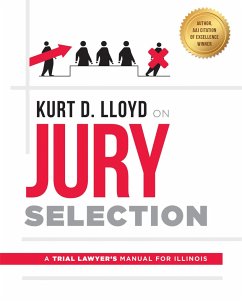
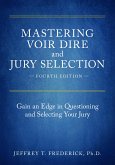
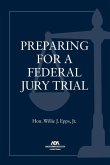
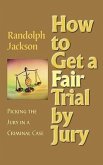
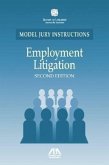
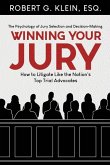
![Copyright, Trademark and Trade Dress Litigation [With CDROM] Copyright, Trademark and Trade Dress Litigation [With CDROM]](https://bilder.buecher.de/produkte/25/25893/25893041m.jpg)
